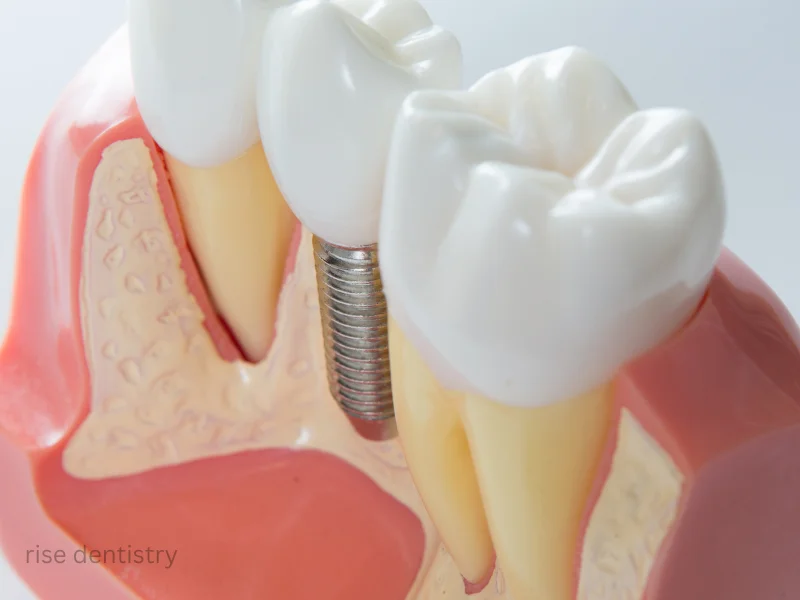
Explore the different types of denture implants, from All-on-4 to implant-supported dentures, and restore your smile. Learn which option suits you best today!
Losing teeth doesn’t just change your smile, it can also affect how you eat and speak. That’s why many people turn to modern implant solutions. They restore confidence, improve comfort, and give you back the freedom to enjoy everyday life.
Unlike old-fashioned dentures, implants are placed directly into the jawbone. This creates strong support that feels secure and natural. With this foundation, you can chew with ease, protect your facial shape, and prevent bone loss over time.
There are several different types of dentures to choose from. Some are fixed permanently, while others are removable implant dentures for easier care. With so many options for dentures, finding the right one depends on your lifestyle and needs. Learning about the main types of denture implants is the first step to a healthier, more confident smile.

Implant supported dentures are designed to feel and function like natural teeth. Small posts are surgically placed into the jawbone, acting as artificial tooth roots. These posts are held in place with tiny screws for strong support.
After healing, dentures attach directly to the implants beneath the gum tissue. This creates a secure fit that prevents slipping, improves chewing, and helps preserve facial shape. Patients often find them more comfortable than traditional dentures.
There are two main choices. Permanent implant dentures stay fixed and resemble natural teeth. Removable implant dentures snap on and off for easy cleaning. Both improve stability and confidence, but the right type depends on your needs and lifestyle.

There are many options for dentures, each created to meet different needs. Below are the main types of implant solutions.
This full arch solution uses four posts placed in the jawbone for strength. They provide permanently fixed teeth that resemble natural ones. Many consider them the best choice for full arch implants.
An implant supported partial denture is ideal when only a few teeth are missing. These can be fixed in place or designed as removable implant dentures.
Overdentures implants, also called snap-on dentures, are removable yet more secure than traditional dentures. They use special attachments that lock onto implants.
Mini dental implants are smaller and less invasive. They are affordable, suitable for low bone density, and often stabilize upper implants.
Full denture implants replace all missing teeth. Upper denture implants may extend into the cheekbone for extra support and stability.
Permanent implant dentures are fixed and long-lasting. Removable implant dentures are flexible, easy to clean, and suit different lifestyles.
Each type of denture implant comes with unique advantages. Here’s how different options can improve comfort, function, and confidence.


Permanently fixed for stability.

Prevents sagging and bone loss.

Resembles natural teeth for a confident smile.


Provides strong support to nearby teeth.

Prevents shifting and misalignment.

Secure attachment for better chewing.


Removable yet stable in daily use.

Simple to clean and maintain.

Snap-on design for comfort and ease.


Quick recovery after placement.

Budget-friendly option for many patients.

Works well with low bone density.


Restores full bite and chewing power.

Improves smile and appearance.

Upper implants may use the cheekbone for extra support.


Permanent implant dentures offer long-lasting stability.

Removable implant dentures give flexibility and easy cleaning.

Choice depends on lifestyle and care needs.
The cost of implants depends on the type, materials, and your dental needs. Below is a breakdown.
These are on the higher end. They are often seen as a long-term investment because they last for many years.
This option usually falls in the mid-range. Prices depend on the attachments used and the material chosen for the denture.
Mini dental implants are considered the most budget-friendly option. They are less invasive and helpful for patients with low jawbone density.
The price of full implants varies based on arch and treatment complexity. Upper implants may cost more if the cheekbone needs support.
Permanent implant dentures cost more due to durability and fixed design. Removable implant dentures are less expensive but may need replacement sooner.
Knowing these costs helps patients choose an option that fits their budget and lifestyle.
Different implant types suit different people. Here’s who benefits most from each option.
Best for patients missing all teeth. Good jawbone density is needed to hold implants securely and ensure lasting results.
An implant supported partial denture works for people missing only a few teeth. Strong gum tissue supports stability and comfort.
Overdentures implants suit those wanting a secure yet removable implant dentures option. They are flexible and easier to maintain.
Mini dental implants are ideal for seniors or patients with lower bone density. They offer stability with a less invasive process.
Full implants are ideal for those with total tooth loss. Upper denture implants may need cheekbone support if the jawbone lacks strength.
Permanent implant dentures are best for active lifestyles, giving long-term stability.
Removable implant dentures fit people who want flexible cleaning and care.
Choosing the right type depends on health, lifestyle, and personal needs. A professional consultation ensures the best fit.
With the right care, implants can last for many years. Here’s how long each type usually lasts.
All-All-on-4 and full implants can last 15–20 years with proper and regular dental checkups.
An implant supported partial denture or overdentures implants often last 10–15 years. Small attachments may need replacing during that time.
Mini dental implants have a shorter lifespan, usually 7–10 years. They are less invasive but need consistent maintenance.

with a soft toothbrush to clean implants and gums gently.

don’t need removal for cleaning, but keep gums healthy and clean the implants regularly.

need extra care: clean daily and soak overnight in a denture solution.

to ensure implants are secure and functioning well.
It relies on four dental implants to hold an entire arch of replacement teeth securely in place. Permanent implant dentures stay fixed, natural, and stable.
Prices vary. All-on-4 are highest, partial mid-range, mini dental implants most affordable, and overdentures implants moderately priced.
All-on-4 lasts 15–20 years. Partials and overdentures implants average 10–15 years. Mini implants last about 7–10 years.
Modern versions use flexible materials and updated attachment systems for comfort and natural look.
Implant supported dentures with titanium posts are FDA-approved and have a high success rate.

There are many types of implants, from All-on-4 and full denture implants to mini dental implants and overdentures implants. Each offers unique benefits for comfort, stability, and appearance.
Your choice depends on several factors. Bone density, gum tissue health, and personal lifestyle goals all influence which option works best. Permanent implant dentures provide lasting stability, while removable implant dentures allow more flexibility and easy cleaning.
At Rise Dentistry, we know every smile is unique. That’s why expert guidance is so important for choosing the right solution.
A consultation helps you find the best fit for your health. We do not fully do part of the work for the implant but patients can come in for a consultation and we can guide you from there. Learn more about Denture Implants and start your journey to a confident, healthy smile with Rise Dentistry.

EXCELLENTTrustindex verifies that the original source of the review is Google. "For years, I avoided the dentist due to my anxiety. Dr. Hassan sorathia and their team completely changed my perspective. The office has such a calming atmosphere, and the staff is compassionate and understanding. They explained every step of my treatment and made sure I was comfortable. I'm so grateful I found them and can now take care of my teeth without fear."Posted onTrustindex verifies that the original source of the review is Google. Rise was amazing! They extracted a wisdom tooth from me and the experience was completely pain free. Thank you so much!Posted onTrustindex verifies that the original source of the review is Google. I’m so grateful I found Dr. Sorathia and his wonderful staff at Rise Dentistry! From the moment I called, his office was incredibly accommodating and got me in immediately. He was professional, kind, and patient, and he truly understood my dental anxiety. I never felt rushed or pressured and he welcomed all my questions and explained each step of the process so I always knew what was happening. He made sure I understood all of my options, allowing me to make the most informed decision for my care. I left feeling comfortable, informed, and confident about my treatment. I will absolutely be returning to Dr. Sorathia and highly recommend him to anyone looking for a compassionate and thorough dentist.Posted onTrustindex verifies that the original source of the review is Google. I’m so glad I found this office! Staff is so kind and professional. They keep your comfort at the top of their priority list. Wish I had found them sooner! Can’t recommend this dentist enough!Posted onTrustindex verifies that the original source of the review is Google. Excellent Staff and Dr Sorathia very knowledgeable pleasant ambiance !Posted onTrustindex verifies that the original source of the review is Google. Had a great experience, no wait time, in and out. Everyone was friendly, informative and professional.Posted onTrustindex verifies that the original source of the review is Google. So refreshing to meet an HONEST dentist who isn’t trying to upsell you anything. Just tells you the facts doesn’t try to sway your opinion, just lays out the options based on facts and allows you to choose for yourself what works best for you. I definitely highly recommend!Posted onTrustindex verifies that the original source of the review is Google. Fantastic service! Had a bad tooth that was absolutely killing me for several days. I load going to the dentist so I don’t have a normal one. Set the appointment in the morning and got in that same day. The dentist explained saving versus extracting the tooth and 35 minutes later I was going home. He was extremely thorough and telling me what he was going to do and with the post office instructions. The staff both out front and his assistants were fantastic!! absolutely could not have asked for a better experience and he will be my dentist going forward.
© 2023-2025 Rise Dentistry. All rights reserved.